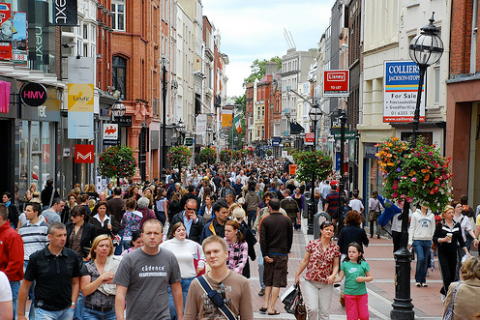The rich get richer

Ireland had the most spectacular collapse in personal incomes of all European counties since 2007 - no other country came close to that subsidence, writes Vincent Browne.
But, in spite of that, Ireland is still one of the richer countries in the EU, far richer than many of the recent accession states and many people here are in the super-rich club, whose wealth worldwide has continued to grow.
The data on personal incomes comes from an extract from the Eurostat data base on incomes. Eurostat reported last week that Ireland was the joint third richest country in Europe, after Luxembourg and the Netherlands. We shared third position with Denmark and Austria. This represented per capita income, based on GDP figures. Because Ireland's GDP figures distort the reality here, I asked the official in Eurostat dealing with these figures for a more realistic comparison. He extracted from the Eurostat data base the gross national income per capita data and forwarded it.
This shows quite a different picture, for instead of Ireland being joint third, Ireland was 11th out of the 27 EU member states, but still above the EU average. The unit of measurement was percentage of EU total based on purchasing power standard (PPS). Therefore the average was 100, Ireland was at 102.7. Luxembourg was again the highest at 191 but that figure is grossly inflated for it includes the considerable income earned by non-residents. Netherlands was the second highest (realistically the first) at 134, Germany at 120, Demark at 127, France at 108.7, the UK at 115.5.
What is spectacular about Ireland is the extent to which our relative per capita income declined, as compared with other EU states. In 2007 our gross national income per capita was 127.5 per cent of the EU average. In 2010 it was 102.5 per cent, a collapse of 25 per centage points. In the UK the percentage drop was only 2.1. In Greece the drop was just 2.6 and in Portugal only 1.8.this is all in comparison with the EU average.
In 2007 we were one of the high flyers with our per capita income at 127 per cent of the EU average. Only Netherlands (134.6) and Sweden (127.9) were higher, along with Luxembourg of course (221). And then what a crash! By far the biggest crash in all of Europe, by a distance. They said it couldn't be done.
But compared with other EU countries Ireland is certainly very rich. For instance, Bulgaria was at 42, that is 42 per cent of the EU average, the poorest country. Latvia at 52 (the figure for 2009). But, interestingly, Ireland was higher than both Italy (98.2) and Spain (99.8). The two other countries in the bail-out, Greece and Portugal, had ratings of 86.5 and 78.0, again we are substantially richer on average than either of these countries.
Richer, that is, on average.
For many years we were the most unequal of most of these countries and although there may have been some adjustments, there is still reason to believe we are still one of the most unequal countries in the OECD (ie the developed world).Certainly the efforts of Richard Bruton now to cut the incomes of some of the lowest paid in our society will go a long way towards ensuring our excellent rating on the inequality scale.
The richest are now known not as the super-rich but as High Net Worth Individuals (HNWI) and the super-super rich are known as Ultra High Net Worth Individuals (UHNWI) and the good news is that there are more of these boyos (for they are nearly all boyos) now than there was a year ago and they are getting richer and richer.
According to the Capgemini and Merrill Lynch Global Wealth Management 2011 Report, the population of HNWIs increased 8.3 per cent to 10.9 million and HNWI financial wealth grew 9 per cent to reach US$42.7 trillion. The global population of Ultra-HNWIs grew by 10.2 per cent in 2010 and its wealth by 11.5 per cent. According to the report, the single largest HNW segment in the world is in the US, with its 3.1 million HNWIs accounting for 28.6 per cent of the global HNWI population. The number of HNWIs in Europe grew by 6.3 per cent in 2010 to 3.1 million, and between them they had wealth of over €8,000,000,000,000 (€8 trillion). Those boyos could sort out the EU debt crisis between them in a jiffy and still have lots and lots of loot left over.
A US study published last Sunday in the Washington Post showed that over the last 35 years the share of national income taken by the best paid 0.1 per cent of the population had quadrupled from 2.5 per cent in 1975 to 10.4 per cent in 2008. It found that 15,000 people had annual incomes on average of $27 million annually. And the principal drivers of this were chief executives of large companies, most of them unknown to the general public.
Just like here. And we have convinced ourselves there is no alternative to this absurdity!
